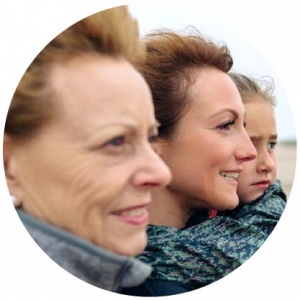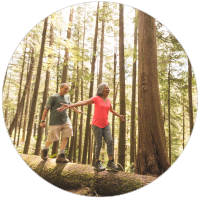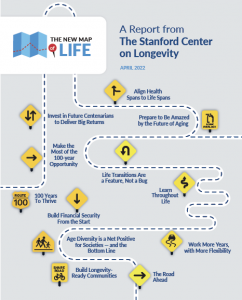The 100-year life is here. We're not ready.
In the United States and beyond, 100-year lives will be common for those born today. Yet, the social institutions, norms and policies that await these future centenarians evolved when lives were only half as long and need updating. In 2018, The Stanford Center on Longevity launched an initiative called The New Map of Life, believing that one of the most profound transformations of the human experience calls for equally momentous and creative changes in the ways we lead these 100-year lives, at every stage. We can meet challenges that longevity creates if we act now, guided by these principles:
Make the Most of the 100-Year Opportunity

The New Map of Life calls on us to shift from a deficit mindset that laments the losses now associated with aging—whether to health, mobility, financial security, independence, or social engagement—and to assess the economic and social contributions of older adults so that we can get a true accounting of net costs and benefits of our current population structure.
Invest in Future Centenarians to Deliver Big Returns
 We can invest in future centenarians by optimizing each stage of life, so that benefits can compound for decades, while allowing for more time to recover from disadvantages and setbacks. The pivotal years between birth and kindergarten are the optimal time for children to acquire many of the cognitive, emotional, and social skills needed for a healthy, happy, and active life.
We can invest in future centenarians by optimizing each stage of life, so that benefits can compound for decades, while allowing for more time to recover from disadvantages and setbacks. The pivotal years between birth and kindergarten are the optimal time for children to acquire many of the cognitive, emotional, and social skills needed for a healthy, happy, and active life.
Align Health Spans to Life Spans
 A key principle of The New Map of Life is that healthy longevity requires investments in public health at every life stage, and health span should be the metric for determining how, when and where to invest. Addressing health disparities means investing not only in better access to healthcare, but in the health of communities, especially those affected by poverty, discrimination, and environmental damage.
A key principle of The New Map of Life is that healthy longevity requires investments in public health at every life stage, and health span should be the metric for determining how, when and where to invest. Addressing health disparities means investing not only in better access to healthcare, but in the health of communities, especially those affected by poverty, discrimination, and environmental damage.
Prepare to Be Amazed by the Future of Aging
 Today’s 5-year-olds will benefit from an astonishing array of medical advances and emerging technologies that will make their experience of aging far different from that of today’s older adults. And while there is no way to stop the process of aging, the emerging field of geroscience has the potential to transform how we age, by seeking to identify—and “reprogram”—the genetic, molecular, and cellular mechanisms that make age the dominant risk factor for certain diseases and degenerative conditions.
Today’s 5-year-olds will benefit from an astonishing array of medical advances and emerging technologies that will make their experience of aging far different from that of today’s older adults. And while there is no way to stop the process of aging, the emerging field of geroscience has the potential to transform how we age, by seeking to identify—and “reprogram”—the genetic, molecular, and cellular mechanisms that make age the dominant risk factor for certain diseases and degenerative conditions.
Life Transitions Are a Feature, Not a Bug

While the conventional life course is a one-way road through prescripted stages, The New Map of Life offers multiple routes connecting the roles, opportunities, and obligations that 100-year lives will bring and it’s expected that people will reset the GPS often. There are intersections, cloverleafs, curves, on-ramps, and off-ramps to and from the decades of life dedicated to paid work, providing more opportunities for informal learning and lifelong learning, and for intergenerational partnerships that improve the flow of knowledge, support, and care in all directions.
Learn Throughout Life
 Rather than front-loading formal education into the first two decades of life, The New Map of Life envisions new options for learning outside the confines of formal education, with people of all ages able to acquire the knowledge they need at each stage of their lives, and to access it in ways that fit their needs, interests, abilities, schedules, and budgets.
Rather than front-loading formal education into the first two decades of life, The New Map of Life envisions new options for learning outside the confines of formal education, with people of all ages able to acquire the knowledge they need at each stage of their lives, and to access it in ways that fit their needs, interests, abilities, schedules, and budgets.
Work More Years with More Flexibility
 Over the course of 100-year lives, we can expect to work 60 years or more. But we won’t work as we do now, cramming 40-hour weeks into lives impossibly packed from morning until night with parenting, family, caregiving, schooling and other obligations. Workers seek flexibility, whether that means working from home at times, or having flexible routes in and out of the workplace, including paid and unpaid intervals for caregiving, health needs, lifelong learning, and other transitions to be expected over century-long lives.
Over the course of 100-year lives, we can expect to work 60 years or more. But we won’t work as we do now, cramming 40-hour weeks into lives impossibly packed from morning until night with parenting, family, caregiving, schooling and other obligations. Workers seek flexibility, whether that means working from home at times, or having flexible routes in and out of the workplace, including paid and unpaid intervals for caregiving, health needs, lifelong learning, and other transitions to be expected over century-long lives.
Build Financial Security From The Start

Financing 100-year lives requires new pathways for working, saving, and retiring. It also calls for new policies that are responsive to current economic realities: Americans’ working lives are more precarious, family structures are more diverse than in previous generations, and more than half of Americans have little to no retirement savings. Without the safety net of Medicare and Social Security, one-third of older adults would live below the poverty line. The New Map of Life seeks to create more opportunities and position toeholds for building financial security, understanding that the actions of individuals are shaped within a wider social and economic context.
Build Longevity-Ready Communities
 The impacts of the physical environment begin before birth, with advantages and disadvantages accumulating over the entire course of life, determining how likely an individual is to be physically active, whether they are isolated or socially engaged, and how likely they are to develop obesity, respiratory, cardiovascular, or neurodegenerative disease. We must start now to design and build neighborhoods that are longevity-ready, and to assess potential investments in infrastructure through the lens of longevity.
The impacts of the physical environment begin before birth, with advantages and disadvantages accumulating over the entire course of life, determining how likely an individual is to be physically active, whether they are isolated or socially engaged, and how likely they are to develop obesity, respiratory, cardiovascular, or neurodegenerative disease. We must start now to design and build neighborhoods that are longevity-ready, and to assess potential investments in infrastructure through the lens of longevity.
Age Diversity Is a Net Positive for Societies – and the Bottom Line
 The speed, strength, and zest for discovery common in younger people, combined with the emotional intelligence and wisdom prevalent among older people, create possibilities for families, communities, and workplaces that haven’t existed before. Rather than dwelling so anxiously on the costs incurred by an “aging” society, we can measure and reap the remarkable dividends of a society that is, in fact, age-diverse.
The speed, strength, and zest for discovery common in younger people, combined with the emotional intelligence and wisdom prevalent among older people, create possibilities for families, communities, and workplaces that haven’t existed before. Rather than dwelling so anxiously on the costs incurred by an “aging” society, we can measure and reap the remarkable dividends of a society that is, in fact, age-diverse.
The Road Ahead
Meeting the challenges of longevity is not the sole responsibility of government, employers, healthcare providers, or insurance companies; it is an all-hands, all-sector undertaking, requiring the best ideas from the private sector, government, medicine, academia, and philanthropy. It is not enough to reimagine or rethink society to become longevity-ready; we must build it, and fast. The policies and investments we undertake today will determine how the current young become the future old—and whether we make the most of the 30 extra years of life that have been handed to us.
Media Coverage

The Future of Work Is a 60-Year Career – The Atlantic

Podcast: “New Map of Life” Cartographers Ken Smith and Karen Breslau – Midlife Mixtape

“Forever Young: Searching for the Fountain of Youth” -CBS Sunday Morning prime time special

As We Live Longer, How Should Life Change? There Is a Blueprint. – The New York Times

Charting The New Map of Life – Next Avenue

How Can We Support 100-Year Lives? – Forbes

Paul Pagnato Advises Students from 120 Universities at Barron’s in Education Event to Embrace Stanford Center on Longevity’s New Map of Life Initiative – Yahoo News
![]() The New Map of Life initiative was made possible in part with the generous support of the Annenberg Foundation.
The New Map of Life initiative was made possible in part with the generous support of the Annenberg Foundation.



